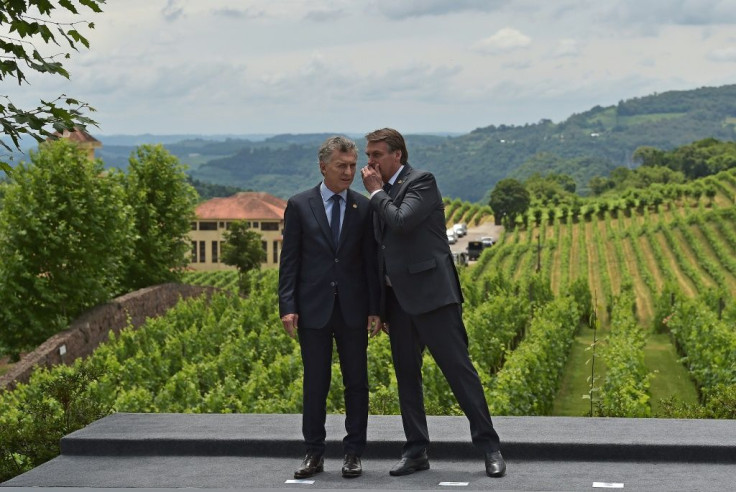Brazil's Bolsonaro Urges Mercosur To Push On With Reforms

Brazil's President Jair Bolsonaro on Thursday urged South America's four-nation trade bloc Mercosur to push ahead with reforms "without accepting ideological setbacks," in a swipe at Argentina's incoming leftist government.
Far-right Bolsonaro made the remarks at the start of a meeting with leaders from Argentina, Paraguay and Uruguay in the southern Brazilian town of Bento Goncalves.
Recent elections have laid bare ideological divisions in the group, particularly between its two biggest members Brazil and Argentina, threatening to hamper ratification of June's historic Free Trade Agreement with the European Union.
"We need to carry out the reforms that are giving vitality to Mercosur, without accepting ideological setbacks," Bolsonaro said, in clear reference to Argentina's recently elected leftist president Alberto Fernandez.
Bolsonaro, who said Wednesday that Buenos Aires had "much more" to lose in case of tensions with Brasilia than vice-versa, will snub Fernandez's inauguration next week.
Brazil is Argentina's largest trading partner, and Argentina is Brazil's third-largest, behind China and the United States.
Brazil has threatened to leave Mercosur, worried that Fernandez, who inherited a serious economic crisis from President Mauricio Macri, will fall back on protectionism.
Macri, attending his last summit of the bloc, said the group should continue "to negotiate agreements that allow us into the global economy."
The political crisis in Bolivia also got a mention at the summit, with Argentina, Brazil and Paraguay expressing support for right-wing interim President Jeanine Anez.
But Uruguay's outgoing leftist Vice President Lucia Topolanksy said the fall of socialist ex-president Evo Morales following last month's disputed elections marked a "break in constitutional" order.
The bloc's two-day summit comes after US President Donald Trump announced plans Monday to impose tariffs on steel and aluminum from Argentina and Brazil.
Trump accused them of manipulating their currencies to gain an unfair advantage for agricultural exports, thereby hurting US farmers.
Both countries stepped in to replace American exports of soybeans and other agricultural goods to China, benefiting from the US trade war with the Asian giant.
The four countries signed eight agreements, including a border police cooperation accord to prosecute fugitive criminals.
They were also to discuss the reduction of the Common External Tariff and the increase in the rate of imports from third countries.
"Excessive pricing affects competitiveness and is detrimental to those who produce," Bolsonaro told the meeting.
"Brazil relies on commercial openness as a development tool."
© Copyright AFP 2024. All rights reserved.




















